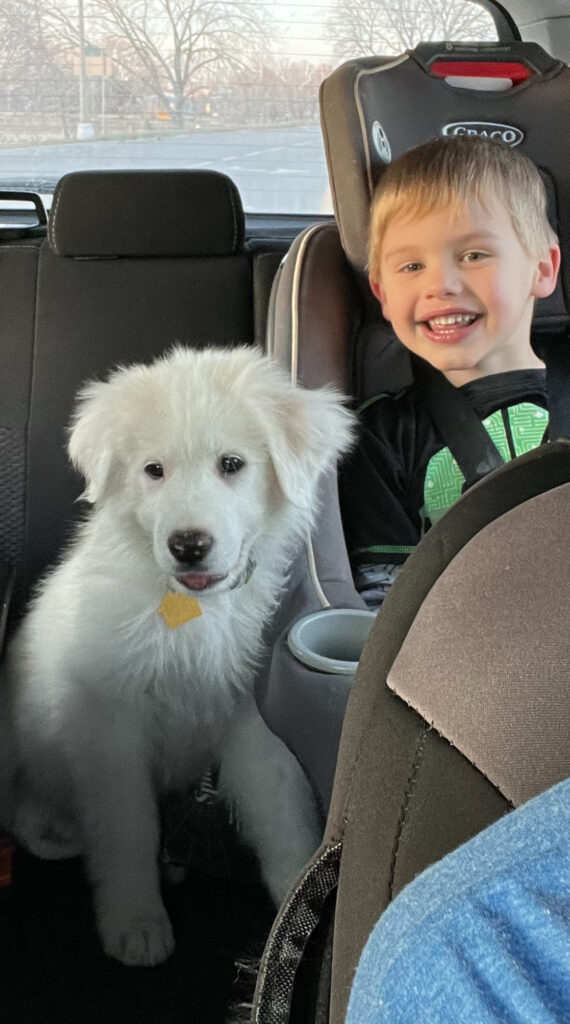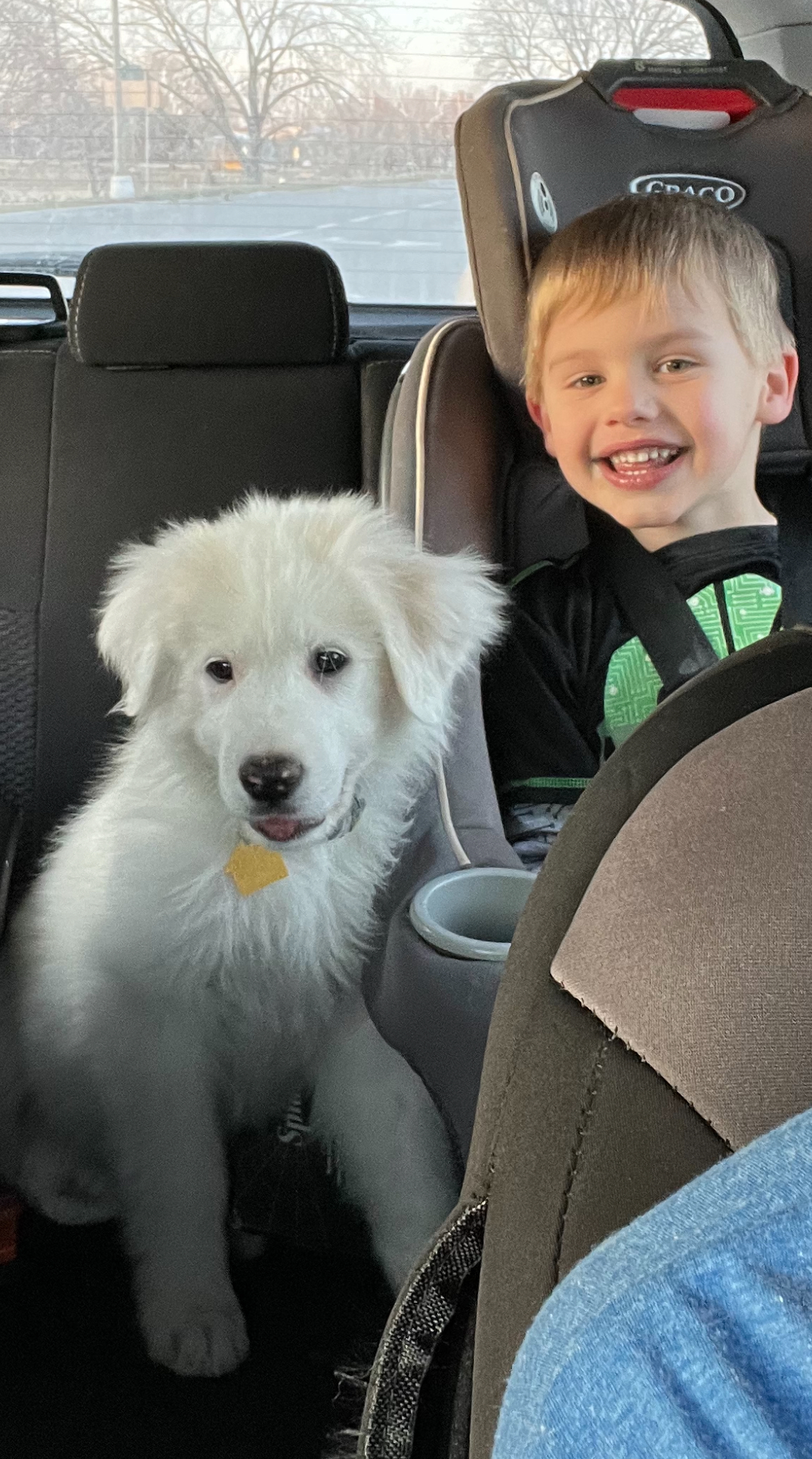Hey there! Some links on this page are affiliate links for Amazon which means that as an Amazon associate, if you choose to make a purchase, I may earn a small comission at no extra cost to you. Thank you so much again for just checking out this page. 🙂

After adopting Dolly I quickly realized that the 2 biggest obstacles were going to be the pottying in the house, and the PLAY BITING. It’s cute and fun until those razor-sharp teeth sink into you, and then the fun stops. We have 2 small children and I have heard that puppies treat them like other puppies, and they play with them the most. We also have a cat that Dolly tries to ‘play’ with, and if she bites the playing stops. I will talk about what we are finding that has been working for us. It’s good to understand why puppies play bite in the first place though.
Play-biting is a common behavior among young dogs. While it’s a natural part of their development, it’s important to teach them to stop biting early on to prevent future behavior issues. In this particular article, I will discuss the reasons behind puppy play biting and provide effective strategies to help you curb this behavior.
Play Biting Puppies are just trying to explore the world around them using their mouths (like babies), and play-biting is a way for them to interact with their environment. It’s also a way for them to communicate with other dogs and humans. However, if not addressed, play biting can escalate into more aggressive behavior.
How to Get Your Puppy to Stop Biting
- Socialization: Proper socialization is key to teaching your puppy bite inhibition. Expose them to different people, animals, and environments to help them learn appropriate behavior. I have noticed when she is around other dogs she doesn’t know her biting is to a minimum, she is one I would say is more submissive than dominant right now anyway so that helps.
- Redirect their attention: When your puppy starts to bite, redirect their attention to a chew toy or bone. This helps them understand what is acceptable to chew on. I know there is a thing online called “The Bark Box”, and it’s where you get sent new dog toys every month, but I’m not a fan of those things taking over my house, and also it just isn’t in the budget. I saw a girl online who said, “Puppy Puppy Puppy!” while distracting them with a toy, or yelping loudly like their mom would. I found that there wasn’t always a toy around, so yelping came in handy when she didn’t have the full-on zoomies.
- Use positive reinforcement: When your puppy stops biting and chews on a toy instead, praise and reward them. Positive reinforcement encourages good behavior. This does work, Dolly would walk right up to me after I said, “Good girl, no biting.”
- Avoid rough play: Rough play can encourage biting behavior in puppies. Instead, engage in gentle play activities to prevent them from becoming overly excited. Tug of war is okay, just let them have the toy every once in a while so they don’t get frustrated.
- Timeouts: If your puppy continues to bite despite your efforts, use a timeout to help them understand that biting leads to the end of playtime. This is when the zoomies are in full effect. We shut her in another room and scolded her if she barked. This helped calm her down and make her realize we meant business.
- Consistency: Consistent training is crucial for teaching your puppy to stop biting. Everyone in the household should use the same techniques to avoid confusing the puppy. Don’t let them bite sometimes and then tell them to stop at other times. Honestly, it’s just best not to let them bite you in general. Dolly tries to bite our clothes to play, but more often than not she gets our skin instead, and that hurts!
- Seek professional help: If your puppy’s biting behavior becomes a concern, seek guidance from a professional dog trainer or behaviorist. In conclusion, puppy play biting is a normal behavior, but it’s essential to teach your puppy to stop biting to prevent future issues.
The Bottom Line
By understanding the reasons behind this behavior and implementing positive training techniques, you can effectively guide your puppy towards more appropriate behavior. Remember that bad behavior is often associated with lack of exercise or attention. Make sure your puppy has plenty of both. With patience, consistency, and positive reinforcement, you can help your puppy develop good bite inhibition and become a well-behaved companion. I know the puppy grows out of play biting eventually, but it will stop sooner the more consistent you are with these 7 methods.
Frequently Asked Questions
- Do puppies grow out of play biting? — Yes, puppies typically grow out of play biting as they mature and learn bite inhibition through training and socialization.
2. How do I get my puppy to stop mouthing play biting? — You can get your puppy to stop mouthing play biting by redirecting their attention to a chew toy or bone, using positive reinforcement when they chew on the toy instead of biting, and avoiding rough play that encourages biting behavior.
3. Is it normal for puppies to bite a lot when playing? — Yes, it is normal for puppies to bite a lot when playing as they explore the world around them using their mouths and interact with their environment. However, it’s important to teach them to control the force of their bites through training and socialization.
4. What command stops a puppy from biting? — The command that can help stop a puppy from biting is a firm “No” or “Stop” accompanied by redirecting their attention to a chew toy, using positive reinforcement, and consistent training techniques.
